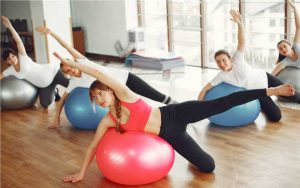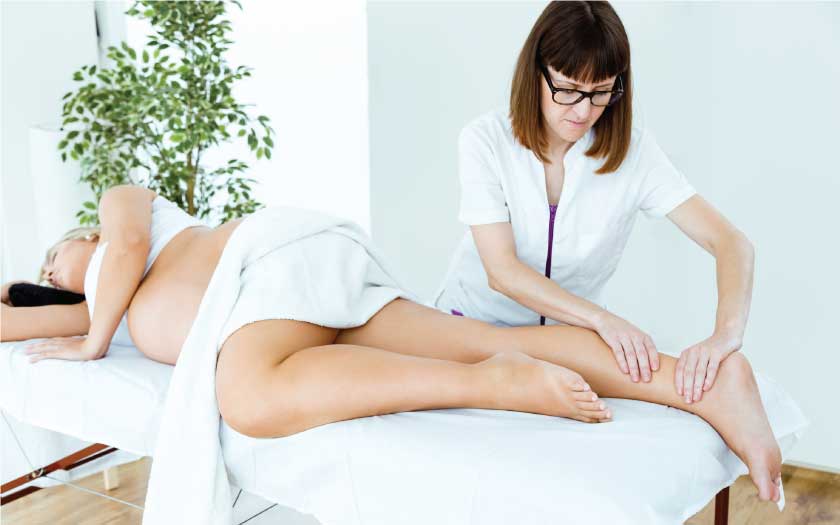Pregnancy can take a toll on a woman’s body, but there are ways to look and feel much better throughout your nine months. Read on…
It goes without saying that the more relaxed you are during pregnancy, the better you’ll feel. Massages and spa treatments are great to relieve those pregnancy-related symptoms and stresses. Exercise is also important as it keeps you fit, strong, and even helps you feel fitter during and after your pregnancy. The trick is to know what you can and cannot do, so let’s find out!
Prenatal massages
Massages may not sound like something a pregnant woman should be undergoing owing to her ‘delicate’ state. On the contrary, though, provided the pregnancy is not a high-risk one, a well-executed pregnancy massage could be just the thing to relieve a sore, tired pregnant body.
A woman undergoes numerous changes physically as well as emotionally throughout her pregnancy and prenatal massages may help alleviate those discomforts and promote a sense of well-being. However, as helpful as they are, it is crucial that they are conducted by massage therapists who are certified in prenatal massages. A therapist certified to perform prenatal massages will have knowledge of pregnancy and the anatomy of a pregnant body. Hence, she will know what can and cannot be done.
A great massage is wonderful because apart from easing backaches, stiff shoulders and sore hips, it could also pep up the spirit and is an amazing mood improver! By allowing feel-good endorphins to flow, prenatal massages help pregnant bodies feel relaxed and refreshed.
Studies suggest that proper massage therapies during pregnancy might have multiple positive effects, including:
- Decreased anxiety
- Less back and leg pain
- Improved sleep
- Increased levels of the pleasure hormones, serotonin, and dopamine
- Decreased levels of the stress hormone, norepinephrine
- Decreased cortisol levels which are an indicator of stress
During a prenatal massage, a specially-designed pregnancy massage table is used for the comfort and safety of the pregnant belly. Special pillows or bolsters may also be used to position a body comfortably on the side.
Pregnancy massages can include anything from a deep-tissue massage that uses firm strokes pressing into muscles, to Swedish massages which call for long strokes with attention to joint mobility. Then, there is the Shiatsu technique which is the tapping of pressure points to stimulate “qi” or natural energy. Other modalities might include circulatory work, reflexology, or cranial sacral therapy.
Benefits of prenatal massages
- Reduction in swellings of the hands, feet, and ankles
- Sciatic pain reduction
- Increase of flexibility
- Relaxation of tensed muscles
- Elimination of toxins via the circulatory and lymphatic systems
- Increase of oxygen in the blood
- Improved blood circulation
Check with your doctor first
Some spas will not massage women in the first trimester of pregnancy because of the risk of miscarriage. While the actual massage itself may not cause a miscarriage, the fact that many miscarriages happen in the first trimester has caused some therapists to be wary of potential liability issues. Doctors’ opinions split too in regards to prenatal massage because it has not been rigorously studied with many spas practicing varied techniques. Nevertheless, do consult with your doctor before trying out a prenatal massage.
Beautifying Facial treatments
Other than for beautifying purposes, facials can be wonderfully relaxing for a pregnant mom.
However, do keep in mind that along with pregnancy comes sensitive, more vulnerable skin. Always ask for a patch test first.
Make sure that your therapist avoids products or treatments that are too harsh or that use chemical. The following ingredients should never be used:
- Tetracycline • Formaldehyde
- Retinoids • Toluene
- Hydroquinone • Ammonia
- Phthalates • Dihydroxyacetone
Manicures and pedicures
Women have always fancied well-groomed nails and pregnant women are no exception.
It should be noted though that nail polish tends to contain chemicals such as formaldehyde and toluene which can irritate the eyes, throat, and lungs. Toluene can also cause health issues to unborn babies especially during the first trimester if their moms are constantly exposed to it.
Treatments to avoid during pregnancy
Pregnant women should steer clear of any kind of treatment using heat during pregnancy because overheating can be dangerous for an unborn baby. Such treatments include:
- Saunas
- Steam rooms
- Tanning beds
- Hot springs
- Hot tubs, whirlpools, and spa baths

Pregnancy is one of the best times to get active even if you have not exercised in a while. Along with the alleviation and prevention of body aches and excess weight gain, exercising help you sleep better, boost energy levels, and increase stamina and muscle strength. Exercise also helps to reduce the risk of gestational diabetes, pregnancy-related high blood pressure, depression, and chances of delivering overly large babies.
Types of exercises
If you are new to exercising during pregnancy, do get your doctor’s approval before you begin, to ensure that you are healthy and free of any form of heart and lung disease, high blood pressure, and cervical problems such as vaginal bleeding. Avoid exercise if you are at risk of preterm labour.
30 minutes of moderate and low-impact daily exercises should be good enough to reap some health benefits. Good choices include swimming, yoga, low-impact aerobics, fitness ball exercises, and cycling on stationary bikes. Stay hydrated and be wary of overworking or overheating. If you find yourself panting, stop immediately.
If you have not exercised in a while, try beginning with 10 minutes a day and gradually increase the duration to 30 minutes. If you have been exercising regularly even before pregnancy, you can probably work out at the same level as long as your doctor approves of it.
Activities to be avoided include those that require you to lie flat on your back, scuba diving, contact sports, activities with risks of falling, and exercises on high altitudes.
Exercising helps with constipation
Pregnant women’s intestinal tracts often get backed up due to high progesterone levels and a growing uterus. Regular exercises, along with a high-fiber diet, should help keep your digestive system running smoothly.
Working out in the water
If you enjoy swimming, you’ll find that some light workout in the water during pregnancy to be incredibly relaxing and you’ll enjoy a wonderful sense of weightlessness. For some women, swimming or water aerobics seems to be the only relief from painful foot and ankle swelling.
Featured image source: iStock


